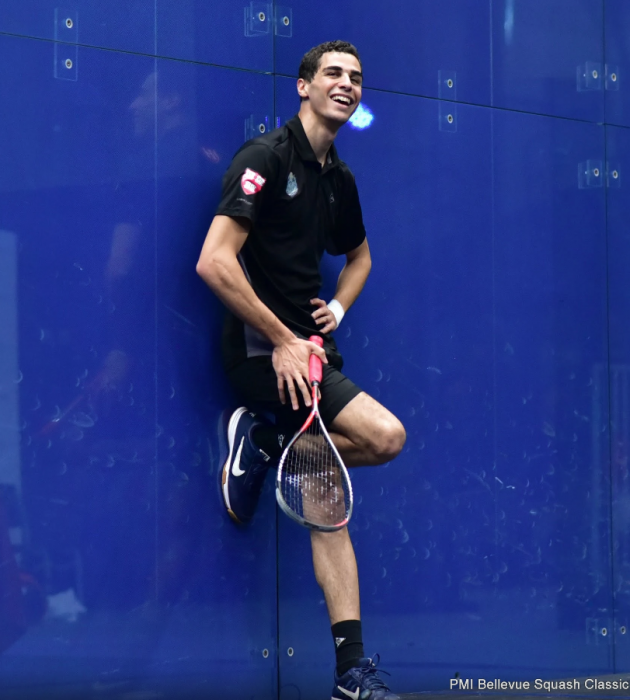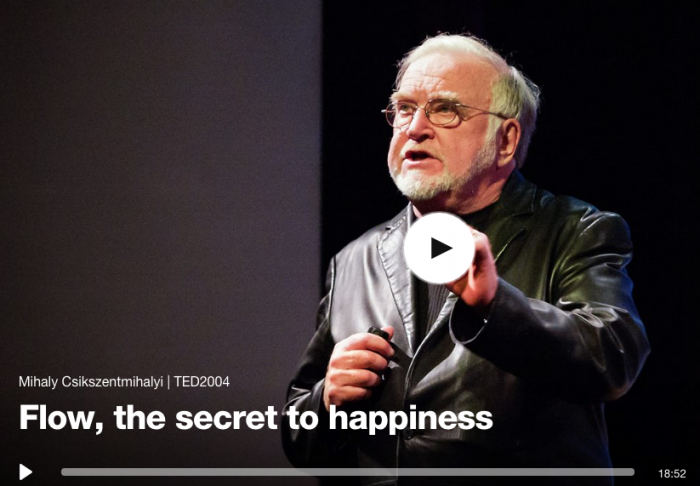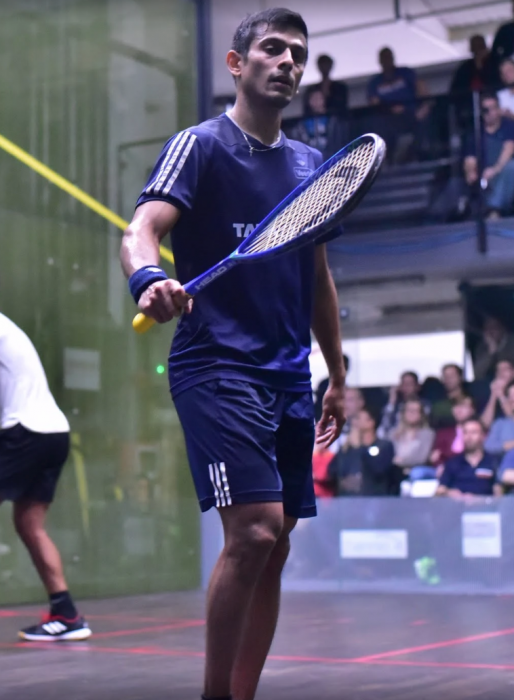Most squash players whether amateur or professional, can recall having at some point played a match where everything just seemed to come together; where winners were rolling off the racket, movement was smooth and effortless, and the mind was free and clear. This state of ‘flow’ is actually a widely studied psychological concept and, while difficult to harness, is something that if embraced can be hugely beneficial not just to your sporting performance, but – if the psychologist behind the theory is to be believed – also to your general happiness and satisfaction in life.
 Flow is a difficult thing to properly quantify and define, but can be described as a mental state of operation in which a person performing an activity is fully immersed in a deep feeling of energized focus, involvement, and enjoyment in the process of the activity. Athletes often describe the sensation as that of being ‘in the zone’, and it’s a feeling frequently associated with positivity, euphoria, and success.
Flow is a difficult thing to properly quantify and define, but can be described as a mental state of operation in which a person performing an activity is fully immersed in a deep feeling of energized focus, involvement, and enjoyment in the process of the activity. Athletes often describe the sensation as that of being ‘in the zone’, and it’s a feeling frequently associated with positivity, euphoria, and success.
Flow doesn’t have to relate to just sport though, it can be a state of mind experienced in as diverse a range of activities as playing music, religious worship rituals, driving a vehicle, cooking a meal, writing, rock climbing, gardening, running, or even playing video games – the common theme being a complete absorption in what the individual is doing, with a resulting loss of the sense of space and time.
Flow tends to occur when a person faces a clear set of goals that require appropriate responses. It is thus often easier to enter flow in sport, because there are goals and rules that make it possible for the player to act within a familiar environment, and without having to think in too much depth about any detailed whats, whys, or hows. For the duration of the game the player exists more or less in a self-contained universe, where everything is black and white. This clarity of goals can also be seen to be present in some of the other activities mentioned above such as playing an instrument or performing a religious ritual – in contrast to normal life, these “flow activities” allow a person to focus on goals that are clear and cohesive, and which provide them with immediate feedback.
The name most associated with the theory of flow is Hungarian-American psychologist Mihaly Csikszentmihalyi. He originally coined the term while studying artists in the 1970s, becoming fascinated with how enthralled and engrossed they would become with their work, often to the exclusion of all else.
Csikszentmihalyi described the sensation of being in flow as “…being completely involved in an activity for its own sake. The ego falls away. Time flies. Every action, movement, and thought follows inevitably from the previous one, like in a music composition. Your whole being is involved, and you’re using your skills to the utmost.”
Exact definitions are broad, but being in a state of flow is typically characterised as including some or all of the following qualities:
- Complete focus and concentration on the task
- A sense of ecstasy, of being outside everyday reality
- Great clarity – knowing what needs to be done, and how well you are doing
- A feel of balance between the difficulty of the challenge and the extent of your skills
- Sensations of effortlessness and ease, with feelings of serenity
- Actions and awareness becoming merged, with a loss of self-consciousness
- Distorted sense of time – becoming so focused on the present that you lose track of time passing
- The experience becoming intrinsically rewarding
- Feelings of personal control over the situation and the outcome
 There’s an excellent TED talk from Csikszentmihalyi worth checking out to understand more about his theories and research, and a discussion of his beliefs of how flow can enhance happiness and quality of life through the pursuit and experience of these states of high cognition where we feel so completely present and deeply focused.
There’s an excellent TED talk from Csikszentmihalyi worth checking out to understand more about his theories and research, and a discussion of his beliefs of how flow can enhance happiness and quality of life through the pursuit and experience of these states of high cognition where we feel so completely present and deeply focused.
In practical terms though, how can we actually utilise the power of flow to make us more successful squash players?
Csikszentmihalyi believes in essence, that a flow state comes from a place where there is a base focus on an enjoyment of the process in an activity, as opposed to a focus on an external result or product. He uses the example of running as an excellent gateway toward experiencing flow. “It’s probably one of the oldest activities that humans enjoy,” he says. “You can begin to lose yourself in the movements and the breathing and even the passage of the landscape around you until it becomes something that is almost a part of you. You are, in a sense, creating a harmonious interaction between your body and its environment. And that can be very enjoyable.”
 Now think of that description back in the context of a squash match – losing yourself in the rhythm of a rally, absorbed into the familiar surroundings of the court, moving smoothly and efficiently while fully engaged in the cut and thrust of the battle with your opponent. Allowing the self to just become absorbed into the game so that self-consciousness is lost, and one can surrender completely to the moment is the goal.
Now think of that description back in the context of a squash match – losing yourself in the rhythm of a rally, absorbed into the familiar surroundings of the court, moving smoothly and efficiently while fully engaged in the cut and thrust of the battle with your opponent. Allowing the self to just become absorbed into the game so that self-consciousness is lost, and one can surrender completely to the moment is the goal.
It’s important to remember that flow only occurs when the skills you believe you possess are matched by the challenge you’re facing, however. Csikszentmihalyi calls this the ‘challenge-skills balance’. Too little a challenge and you will often feel bored and distracted, while if confronted by too great a challenge one can become anxious and feel intimidated. In either instance, the lack of balance means you can’t focus enough to perform at your best.
Research has also indicated that a precursor to flow is a commitment of dedication to improving in the sport/activity, and a focus on the hard work of development through practice. Being able to engage in deep, intentional, focused intervals of growth and learning helps the mind get into a flow state when it comes time to play and compete. A focus on growing, learning, and goal-setting will help not just your mental state, but your ability to achieve your desired outcomes across the board in sport and life.
Some will find it easier than others, but with a little work on appropriate focus and how to best direct your attention, tapping into a flow state is achievable by anyone.
Tips to help you get into a flow state before your squash match:
- Be mindful (aware, but non-judgmental) about your thoughts and feelings as you approach your competitive environment. Practising meditation techniques can help you become better at this
- If there are feelings of anxiousness obstructing you due to a sense that your perceived skill level is not high enough to match the perceived level of challenge, use arousal control techniques such as deep breathing or listening to calming music to relieve your anxiety
- If you find your focus frequently wanders or you often feel distracted, incorporate focusing technique such as imagery or visualisation into your routine to help increase your ability to maintain an engaged and concentrated mind
- Visualize yourself becoming fully engaged, prepared, and confident when you step on court with your opponent, ready to immerse yourself in the joy and rhythm of the game
- Let yourself become engaged, feel the flow state of mind, and enjoy the feeling of testing yourself and competing
For more great content on sports psychology for squash, check out Peter Nicol’s thoughts on mental toughness along with his tips to help control your thoughts and be able to effectively close out tight matches, and this great playlist on the mental side of matchplay from top US coach Paul Assaiante. We also have a fantastic library of psychology articles on our SquashSkills blog.
Gary Nisbet
B.Sc.(Hons), CSCS, NSCA-CPT, Dip. FTST
SquashSkills Fitness & Performance Director
Check out Peter Nicol's thoughts on mental toughness
Peter’s tips help you to control your thoughts and be able to effectively close out tight matches.
Go to playlist